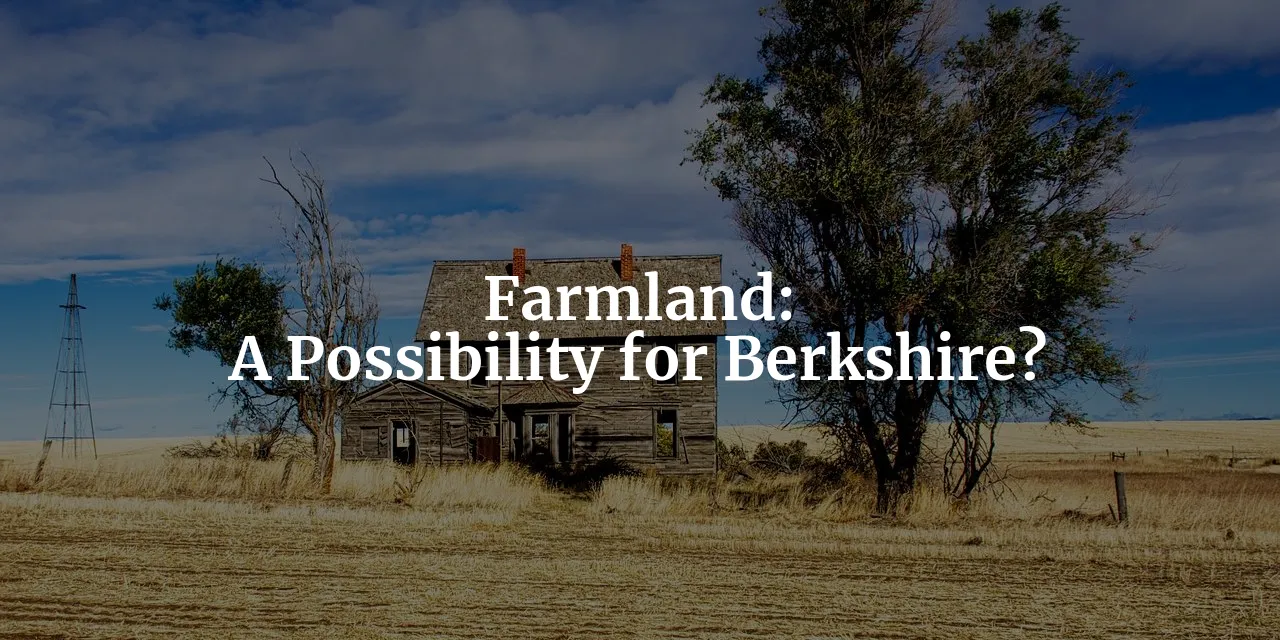Tags: Warren Buffett / Comments
This fanpage is not officially affiliated with Berkshire Hathaway: Disclaimer
Let us discover the untapped potential of farmland investments as a strategic move for Berkshire Hathaway. Explore the historical success, economic rationale, and technological advancements that make farmland a compelling option to Berkshire's diverse portfolio.

Introduction
In the realm of investment, the stories of Warren Buffett and Bill Gates not only highlight unparalleled success but also underscore a shared interest in a less-discussed asset class: farmland. Warren Buffett, the Oracle of Omaha, embarked on his investment journey with a notable purchase of 40 acres of Nebraska farmland at the tender age of 15, using $1,200 of his hard-earned savings from various entrepreneurial endeavors 1. This early venture into farmland investment was an important part in the beginning of Buffett's illustrious career and also showcased his innate understanding of value investing ↗. The exact number of properties Buffett currently holds is not disclosed. It is known that he owns at least 400 acres of residential and agricultural properties, which are rented out to his son 3.
Similarly, Bill Gates, co-founder of Microsoft and one of the wealthiest individuals globally, owns over 269,000 tillable acres, underscoring a significant belief in the strategic value of farmland 2. This convergence in investment philosophy between two of the world's most successful investors raises a compelling question: Should Berkshire Hathaway consider bolstering its investment portfolio with farmland?
This article aims to explore the potential of farmland as a strategic investment for Berkshire Hathaway, drawing parallels from the investment strategies of Buffett and Gates. We will delve into the historical context, economic rationale, and the evolving dynamics of agricultural technology to assess the viability and attractiveness of farmland investments. By understanding the pros and cons associated with this unique asset class, shareholders and potential investors can gain insights into its relevance and potential integration into Berkshire's diverse portfolio.
Historical Context of Farmland Investment
Farmland has historically been a cornerstone of wealth and economic stability. From feudal times to the modern era, the intrinsic value of land has been recognized universally. Warren Buffett's astute recognition of this value led to his early investment in farmland, which he managed through a profit-sharing arrangement, demonstrating not only his knack for spotting investment opportunities but also his innovative approach to maximizing returns 1.
The appeal of farmland investment surged notably after the 2008 financial crisis, with major investment funds like Manulife and Nuveen significantly increasing their farmland acquisitions as a hedge against inflation and to capitalize on the growing global food demand 4. This trend reflects a broader recognition of farmland as a resilient asset class that consistently appreciates over time.
The value trajectory of U.S. farmland underscores its economic resilience and growth potential. From a valuation of $1.2 trillion in 2004, the total value of farm real estate in the United States escalated to an impressive $3.3 trillion by 2022 7. This steady appreciation is a testament to the enduring appeal of farmland as an investment:
| Year | Value of U.S. Farm Real Estate |
|---|---|
| 2004 | $1.2 trillion |
| 2014 | $2.6 trillion |
| 2022 | $3.3 trillion |
This table illustrates the significant growth in the value of U.S. farmland, reinforcing its potential as a stable and lucrative investment. As Berkshire Hathaway contemplates its future investment strategies, the historical context and proven resilience of farmland offer compelling reasons to consider this asset class as part of a diversified investment portfolio.
During economic downturns, such as the farm crisis of the 1980s, farmland demonstrated remarkable resilience. Despite facing significant challenges, land values rebounded by more than 400% after the crisis, highlighting the asset’s ability to recover and grow in value over the long term 5. Additionally, the shift in ownership patterns, with a decrease in the number of U.S. farms but an increase in average farm size, indicates a consolidation trend that could influence investment strategies and land management practices 6.
Economic and Investment Rationale for Farmland
The allure of farmland as a strategic investment has been underscored by its historical performance and resilience. Over the past 50 years, farmland has offered an average return of around 6%, adjusted for inflation, demonstrating its stability and resistance to economic fluctuations 2. This asset class not only provides annual income through cash rent or crop share arrangements but also appreciates in value over time, offering a dual return that is particularly attractive in volatile markets 5.
The increasing global food demand acts as a significant driver for the value of farmland. As populations grow and develop, the need for more food production escalates, thereby enhancing the intrinsic value of productive land. Investment funds have recognized this trend, acquiring over a million acres of U.S. farmland as a hedge against inflation and to capitalize on this growing demand 4. This strategic move is supported by federal programs such as crop insurance and commodity subsidies, which reduce investment risks and enhance the attractiveness of farmland 4.
However, farmland is not without its challenges, particularly regarding liquidity. Unlike stocks or bonds, farmland cannot be quickly sold or traded on a daily basis. Platforms like AcreTrader address this issue by providing a marketplace where investors can trade shares of farmland, thus offering a new avenue for liquidity while still respecting the long-term nature of farmland investment 5.
In terms of economic downturns and inflation, farmland has proven to be a resilient asset. Its value does not correlate directly with volatile stock markets and has historically provided stable returns even during economic crises. For instance, during the 1980s farm crisis, despite a temporary decline in land values, farmland continued to produce commodities and generate income, showcasing its enduring value 5.

Blockchain and Technological Advancements in Agriculture
The integration of blockchain technology in agriculture marks a revolutionary step towards enhancing transparency, efficiency, and traceability in the farming sector. Blockchain's ability to provide a secure and immutable ledger means that every transaction or movement of goods can be accurately recorded and verified, minimizing the risk of fraud and increasing the trustworthiness of food products 2.
Companies like AgriDigital and IBM Food Trust are at the forefront of incorporating blockchain into agricultural operations. These technologies enable farmers and agricultural businesses to track their products from the farm to the table, offering consumers detailed information about the origin and journey of their food 2. This not only helps in building consumer trust but also streamlines operations, potentially reducing costs and increasing the profitability of farming enterprises.
For investors and companies like Berkshire Hathaway, these technological advancements could make farmland an even more attractive investment. By increasing operational efficiencies and potentially boosting yields through better data management and reduced waste, blockchain could enhance the overall value of farmland. Moreover, the technology supports sustainable and environmentally friendly farming practices by ensuring compliance with regulatory standards and facilitating quality control, further adding to the long-term value of the investment 2.
The potential for blockchain to transform agricultural practices extends to regulatory compliance and quality control. Smart contracts, for instance, can automate payments and ensure that all parties meet their contractual obligations without delay or error, thereby reducing operational risks associated with farming.
The strategic integration of blockchain technology in agriculture not only aligns with the current trends towards digital transformation but also enhances the intrinsic value of farmland as an investment. For a conglomerate like Berkshire Hathaway, leveraging these technological advancements could provide a significant competitive edge in the agricultural sector, ensuring that their farmland investments continue to yield substantial returns in an increasingly tech-driven world.
Berkshire Hathaway's Current Investment Strategy
Berkshire Hathaway has long been known for its unique investment strategy that focuses on acquiring high-quality assets at reasonable prices. This strategy has consistently yielded substantial returns, as evidenced by a compound annual gain of 19.8% from 1965 to 2023, significantly outpacing the S&P 500's gain of 10.2% 8. In recent times, Berkshire Hathaway has amassed a staggering $168 billion in cash and cash equivalents, showcasing an unprecedented level of liquidity and financial resilience 8.
The strategic accumulation of cash positions Berkshire uniquely to make substantial investments, even in times of market downturns. Given the current economic climate and the historical performance of farmland as a stable, value-producing asset, it seems plausible that farmland could be a fitting addition to Berkshire’s portfolio. Farmland has demonstrated resilience across economic cycles, often providing stable returns and serving as a hedge against inflation, which aligns well with Berkshire's investment philosophy.
In 2023, Berkshire Hathaway reported a 21% increase in operating earnings, totaling $37.4 billion 8 ↗. This financial capacity, coupled with strategic cash reserves, provides a robust platform for large-scale investments in assets like farmland. Warren Buffett’s emphasis on "extreme fiscal conservatism" as a corporate pledge underscores the strategic approach of maintaining ample liquidity to safeguard against economic uncertainties and to capitalize on investment opportunities without jeopardizing the company’s financial health 8.
Adding farmland to Berkshire’s investment portfolio could offer diversification benefits and stabilize returns, especially in volatile markets. The potential synergies between Berkshire’s existing businesses in insurance, utilities, and food services, and farmland investments could further enhance value creation ↗. For instance, leveraging agricultural produce from owned farmlands could supply Berkshire-owned food companies, creating an integrated supply chain that reduces costs and improves efficiency.

Challenges and Risks in Farmland Investment
Despite the attractive aspects of farmland investment, there are significant challenges and risks that Berkshire Hathaway would need to consider. Farmland investment is not devoid of operational risks, heavily influenced by environmental factors such as weather conditions, which can drastically affect yield and, consequently, profitability 5. These risks require sophisticated management strategies and a deep understanding of agricultural operations, areas that may not be Berkshire’s core competencies.
Market risks are also prevalent, with commodity price fluctuations posing a significant threat to the stability of returns from farmland investments. Given that commodity prices can be highly volatile, influenced by global supply-demand dynamics, policy changes, and economic conditions, the impact on farmland returns can be substantial 5.
From a regulatory standpoint, there is increasing scrutiny and potential backlash against large corporate ownership of farmland. Lawmakers and public opinion may view large-scale acquisitions by conglomerates like Berkshire as detrimental to local farmers, potentially leading to regulatory hurdles 4. Senator Cory Booker’s bill to restrict investment fund purchases of farmland highlights the growing legislative focus on this issue 4.
Liquidity challenges also pose a significant risk. Farmland is not a liquid asset, and the process of selling can be lengthy and complex. This could be a critical issue for an institutional investor like Berkshire, which might require quick asset liquidation in certain scenarios 5. The limited buyer pool and complex selling processes further exacerbate this risk.
Lastly, the global geopolitical landscape can impact farmland investments. Issues such as trade wars, sanctions, and global political tensions can affect commodity prices and, by extension, the value of farmland. This adds a layer of unpredictability and risk that must be carefully managed.
While the strategic move into farmland investment could align well with Berkshire Hathaway’s historical investment philosophy and provide diversification benefits, it is imperative to thoroughly assess and strategize around the operational, market, regulatory, liquidity, and geopolitical risks associated with such investments. This careful consideration will ensure that any move into farmland investment is both strategic and sustainable, aligning with Berkshire's long-term investment goals and risk management framework.
Potential Stakeholder and Market Reaction
The announcement of Berkshire Hathaway's strategic pivot towards farmland investment could stirr a variety of reactions among stakeholders and market observers. Given the conservative yet resilient nature of farmland as an asset class, shareholders of Berkshire Hathaway might greet this move with a mix of cautious optimism and curiosity. As outlined, farmland has historically offered stable returns and protection against inflation, aligning well with Berkshire's investment philosophy which prioritizes long-term value and safety. However, considering the company's traditional focus on insurance, finance, and transportation ↗, this venture into agriculture might require a period of adjustment and reassurance for shareholders accustomed to more conventional investments.
Market perception would likely be dual-faceted. On one hand, the inherent stability and growing demand for agricultural products globally could paint this move as a savvy diversification strategy, especially in times of economic uncertainty. On the other hand, the less conventional appeal of farmland compared to tech or industrial sectors might leave some investors skeptical about the potential for dynamic growth.
Competitors and other institutional investors could see Berkshire’s entry into this space as a validation of farmland as a viable investment class, potentially prompting a review of their own investment strategies. Companies like Manulife and Nuveen, which have been increasing their farmland holdings since the 2008 financial crisis, might either see this as increased competition or an opportunity for partnerships in joint ventures or fund structures.
The reaction from environmental and agricultural advocacy groups could be mixed. While some might view corporate investment in farmland as a threat to traditional farming and local communities, others might see an opportunity for promoting sustainable farming practices if Berkshire Hathaway emphasizes environmental stewardship in its operational approach. The recent legislative proposals aiming to restrict corporate ownership of farmland will be a critical aspect to watch, as noted by sources 4. This could lead to heightened scrutiny and potentially stricter regulations on Berkshire’s agricultural ventures.
Governmental and regulatory responses could be significant, especially with movements in the legislative framework that might limit or shape the way corporate entities can invest in farmland. The endorsement by Senator Cory Booker of a bill to restrict such investments indicates a growing governmental focus on preserving farmland accessibility for traditional farmers and preventing monopolistic practices 9, see also some notes in the annex.
Partnerships or conflicts with existing agricultural operators and landowners would be pivotal. Berkshire Hathaway’s approach to managing these relationships will be crucial in determining the success of their farmland investments. Collaborative approaches that benefit local farming communities and leverage their expertise could foster goodwill and enhance the productivity of these investments.
Hence, the market and stakeholder reaction to Berkshire Hathaway’s foray into farmland investment would be a complex tapestry woven with threads of opportunity, skepticism, and regulatory scrutiny ↗. How this strategy would unfold would depend significantly on the company’s ability to adapt to a new industry, manage stakeholder relationships, and respond to regulatory changes.

Conclusion
The potential for Berkshire Hathaway to venture into farmland investment presents a compelling opportunity that aligns with the historical success and investment philosophy of Warren Buffett. As highlighted by Buffett's early foray into farmland at the age of 15, the intrinsic value and resilience of land as an asset class have been proven over time 1. This historical context, coupled with the economic rationale and technological advancements in agriculture, underscores the attractiveness of farmland as a strategic move for Berkshire Hathaway.
The economic and investment rationale for farmland investment, including stable returns, inflation hedging, and the increasing global food demand, make it a valuable addition to Berkshire's diversified portfolio. The integration of blockchain technology in agriculture further enhances the value proposition of farmland investments, offering transparency, efficiency, and sustainability benefits 2.
Berkshire Hathaway's current investment strategy, characterized by fiscal conservatism, ample liquidity, and a focus on high-quality assets, positions the company well to explore farmland investments. The potential synergies with existing businesses and the stable returns offered by farmland could further enhance Berkshire's long-term value creation 8.
However, it is crucial to acknowledge and address the challenges and risks associated with farmland investment, including operational, market, regulatory, liquidity, and geopolitical factors 9. Careful consideration and strategic planning are essential to mitigate these risks and ensure the sustainability of farmland investments within Berkshire's portfolio 5.
The stakeholder and market reaction to Berkshire's potential move into farmland investment would be multifaceted, reflecting a mix of optimism, skepticism, and regulatory scrutiny ↗. How Berkshire navigates these reactions and manages relationships with stakeholders, competitors, and regulatory bodies would be critical in determining the success of its farmland investments.
In the words of Warren Buffett, "Diversification is protection against ignorance. It makes little sense if you know what you are doing." This quote underscores the importance of informed decision-making and strategic diversification, highlighting the potential value of farmland as a prudent addition to Berkshire Hathaway's investment portfolio.
As Berkshire shareholders and the broader investment community continue to evaluate the viability of farmland as an asset class, further research and discussion are encouraged to explore the impact of climate change, sustainable practices, and evolving market dynamics on farmland investments ↗. By staying informed and proactive, stakeholders can make well-informed decisions that align with Berkshire's long-term investment goals and risk management framework.
Annex: Key points from the Farmland for Farmers Act
U.S. Senator Cory Booker (D-NJ) introduced the Farmland for Farmers Act on July 27, 2023 9. This legislation aims to address the rising rates of corporate farmland investment by limiting future ownership and leasing by corporate investors. The goal is to ensure that farmland in the United States remains in the hands of farmers.
Here are the key points from the Farmland for Farmers Act:
- Protecting Rural Communities: With over 400 million acres of U.S. farmland projected to change hands in the next decade, the bill takes a stand against corporate consolidation that threatens rural communities' autonomy. If farmland continues to fall under corporate control, it could shut down thousands of family farms and small businesses, eliminate opportunities to live in rural communities, and erode essential public and social infrastructure such as schools and hospitals.
- Curbing Speculative Investments: The bill prevents corporations and hedge funds from treating farmland as a speculative investment to mitigate market volatility. Rising farmland prices have created challenges for small and beginning farmers to access land, leading to the unfair advantage of corporate interests over independent family farmers.
- Bringing Transparency in Land Ownership: Corporations often use multi-level subsidiary structures to conceal their investments in farmland. The legislation aims to bring transparency to land ownership.
- Strengthening Federal Land Policies: The bill addresses the lack of existing federal oversight, especially as Wall Street investment in farmland soars and the market becomes more nationalized. Through meaningful reforms, the bill tackles concerns related to national security, economic competition, domestic food security, and the vitality of farm communities.
- Ensuring Fair Allocation of Farm Programs: Federal agricultural programs are a vital safety net for farmers, but they are sometimes misused by corporate investors to reduce the risk of owning American farmland. The bill aims to prioritize independent farmers who form the backbone of the farm sector.
Senator Booker emphasized the importance of protecting farmland from becoming an investment strategy for huge corporations and ensuring that independent family farmers have opportunities to thrive. His endorsement of this bill reflects a growing governmental focus on preserving farmland accessibility for traditional farmers and preventing monopolistic practices.
References
-
Warren Buffett Earned Enough Money As A Kid Selling Gum, Coca-Cola And Delivering Newspapers To Buy 40 Acres Of Farmland At Age 15 - finance.yahoo.com ↩↩↩
-
Gates, Buffett Prefer Farmland To Crypto As Blockchain Gains Steam Across Agriculture - www.forbes.com ↩↩↩↩↩↩
-
How Much Land Does Warren Buffett Own? - www.netnethunter.com ↩
-
Investment funds stocking up on US farmland in safe-haven bet - www.reuters.com ↩↩↩↩↩↩
-
Assessing The Risks Of Farmland Investing | AcreTrader | AcreTrader - acretrader.com ↩↩↩↩↩↩↩↩
-
The number of U.S. farms continues slow decline - www.ers.usda.gov ↩
-
U.S. farm real estate: total value of farmland and buildings 2022 | Statista - www.statista.com ↩
-
Berkshire Hathaway Is Hoarding $168 Billion in Cash -- Here's Why - finance.yahoo.com ↩↩↩↩↩
-
Booker Introduces Legislation to Protect Farmland from Corporate Consolidation - www.booker.senate.gov ↩↩↩












